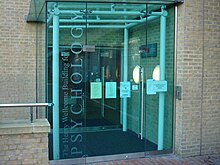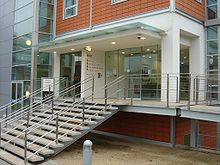Institute of Psychiatry, Psychology and Neuroscience
This article or section may have been copied and pasted from another location, possibly in violation of Wikipedia's copyright policy. (December 2013) |
 Entrance of the Institute of Psychiatry. | |
| Established | 1948[1] |
|---|---|
Parent institution | King's College London |
| Dean | Shitij Kapur |
| Location | , |
| Website | kcl.ac.uk/iop |
The Institute of Psychiatry (IOP) is a research institution dedicated to discovering what causes mental illness and diseases of the brain. In addition, its aim is to help identify new treatments for them and ways to prevent them in the first place. The IOP is a school of King's College London, England.
The Institute works closely with South London and Maudsley NHS Foundation Trust. Many senior academic staff also work as honorary consultants for the Trust in clinical services such as the National Psychosis Unit at Bethlem Royal Hospital.
History
The IOP shares a great deal of its history with the Maudsley Hospital, with which it shares the location of its main building. Originally the "Maudsley Hospital Medical School", it changed its name to the Institute of Psychiatry in 1948 with Aubrey Lewis being appointed to the inaugural Chair of Psychiatry at the institute (which he held until his retirement in 1966). The main Institute building was opened in 1967 and contains lecture theatres, administrative offices, the library, and the "Cafe Diner" canteen.
The Henry Wellcome building was opened in 2001 and houses most of the IOP's psychology department.
In 2002, the Social, Genetic and Developmental Psychiatry (SGDP) Research Centre moved into a purpose-built building of their own.
In 2004, a new Centre for Neuroimaging Sciences (CNS) was opened which provides offices, lab space, and access to two MRI scanners for neuroimaging research.
Departments
Addictions
The Addictions Department specialises in research into tobacco, alcohol and opiate addiction policy and treatment. In March 2010 the addiction research unit and the sections of alcohol research, tobacco research and behavioral pharmacology were brought together to form the current The Addictions Department, also known as the National Addiction Centre (NAC).[2]
Biostatistics
This department provides advice in the interpretation and use of statistical techniques in psychological research. They work closely with members of the Neuroimaging section in their work using brain scanners.
The Biostatistics department opened in 1964, then as the Biometrics Unit. The department holds particular expertise in multivariate statistical methods for measurement, life-course epidemiology and the analysis of experimental, genetic and neuropsychiatric data.
The department provides both introductory and advanced training in applied statistical methodology, collaborate on studies of mental health based here and internationally, and undertake research in relevant applied methodology.
The department also hosts the UKCRN accredited King's Clinical Trials Unit which provides randomisation, data management, analysis and trial management - all of which are available to researchers across King's Health Partners. The CTU provides support to both medicinal and non-medicinal clinical trials assisting researchers in the conduct of carrying out clinical trials.
Child and Adolescent Psychiatry
The department is dedicated to the study of developmental disorders such as ADHD, clinical depression, autism and learning difficulties. The department has close links with the Michael Rutter Centre for Children and Young People at the Maudsley Hospital which has a number of specialist services for children and adolescents.
Forensic Mental Health Science
Forensic Mental Health Science is the study of antisocial, violent, and criminal behaviours among people with mental disorders. The department's research focuses on antisocial behaviour as it appears in people with either major mental disorders or personality disorders. The department is closely allied to the Forensic Psychiatry Teaching Unit.
Neuroscience
Researchers in this department carry out a range of studies into diseases such as Alzheimer's disease and motor neuron disease. The Institute of Psychiatry now houses the Medical Research Council Centre for Neurodegeneration Research, where pioneering research is conducted investigating disease of the CNS. The Department of Clinical Neuroscience in Windsor Walk also contains the MRC London Neurodegenerative Disease Brain Bank.
Department of Neuroimaging and Centre for Neuroimaging Sciences
The Centre for Neuroimaging Sciences (CNS) is a joint venture of the King's College London Institute of Psychiatry and the South London and Maudsley NHS Trust (SLAM). Completed in early 2004, the centre provides an interdisciplinary research environment.
The Clinical Neuroimaging Department, situated at the Maudsley Hospital, provides a full range of neuroradiographic imaging services, including Magnetic Resonance Imaging (MRI). Within the CNS, the academic Department of Neuroimaging's [3] Major Research Facility (MRF) manages a range of MRI facilities for research studies. The Department of Neuroimaging also runs an EEG laboratory, re-launched in 2010.
Psychology

The IOP Psychology department was founded in 1950. The department conducts research in neuropsychology, forensic psychology, and cognitive behavioural therapy. Hans Eysenck set up the UK's first qualification in clinical psychology in the department, which has now evolved into a three-year doctoral 'DClinPsych' qualification.
Clinically, members of the department offer expert services to the Maudsley Hospital, Bethlem Royal Hospital, King's College Hospital, Guy's Hospital and community mental health teams in the South London area. Members of the department also teach psychology to undergraduate medical students from the United Medical and Dental Schools of Guy's and St Thomas' Hospitals. Psychiatric geneticist Peter McGuffin was awarded a fellowship at the Institute.
Social, Genetic and Developmental Psychiatry

The SGDP centre is a multi-disciplinary research centre devoted to the study of the interplay between “nature” (genetics) and “nurture” (environment) as they interact in the development of complex human behaviour. Research at the SGDP acknowledges that there is no simple solution to the "nature versus nurture" debate; instead, expertise is combined across fields such as social epidemiology, child and adult psychiatry, developmental psychopathology, development in the family, personality traits, cognitive abilities, statistical genetics, and molecular genetics. In this way it is hoped that a greater understanding can be achieved in risk factors that might predispose an individual to depression, ADHD, or autism.
Section of Neurobiology of Psychosis
The department aims to understand the underlying neural mechanisms in schizophrenia and bipolar disorder. Work focuses on integrating cognitive measures and neuroimaging techniques, with perinatal, genetic and developmental data. The central aim is to characterize the core pathophysiological dimensions of schizophrenia and bipolar disorder. The section has initiated or participated a number of such treatment studies of new atypical antipsychotics and potential mood stabilising medication and is also developing computerised and web-based applications for disease self-management.
The section head is Sophia Frangou supported by 15 postdoctoral and doctoral researchers.
Funding
Approximately 70% of the IOP's income comes from the research it conducts. Approximately 20% is from clinical work performed for the South London and Maudsley NHS Foundation Trust. Approximately 10% of gross income is from taught courses offered to postgraduate students.[4]
Sources include the government's National Institute for Health Research and Higher Education Funding Council for England, grant-giving bodies such as the Medical Research Council (UK) and the Wellcome Trust, as well as other governmental, charitable and private-sector organisations. Individual research teams secure around £130 million of funds for their projects each year. Many projects are carried out in partnership with other university and health services, charities and private companies.[5]
The IOP and the pharmaceutical company Lundbeck are leading one of the largest ever academic-industry collaborations in research, known as NEWMEDS - Novel Methods leading to New Medications in Depression and Schizophrenia. The project is part of the Innovative Medicines Initiative developed by the European Federation of Pharmaceutical Industries and Associations and the European Commission. NEWMEDS aims to facilitate the development of new psychiatric medications by bringing top scientists and academics together in partnership with nearly every major global drug company.[6]
Notable staff and students
Amongst notable staff of the Institute are the following:
- Simon Baron-Cohen
- Anthony Clare
- John Cutting
- Hans Eysenck
- Thalia C. Eley
- Jeffrey Alan Gray
- Francesca Happé, professor of cognitive neuroscience
- Beate Hermelin (1920-2008), German-born experimental psychologist, who worked in the UK
- Susan Lea
- Aubrey Lewis
- Ann McNeill
- Adrian Owen
- Martin Roth
- Katya Rubia
- William Sargant
- Peter Scott (psychiatrist)
- Michael Shepherd
- David Stafford-Clark
- Janet Treasure
- Til Wykes
See also
Notes and references
- ^ "Welcome message from the Dean". King's College London. Retrieved 21 March 2013.
- ^ http://www.kcl.ac.uk/iop/depts/addictions/about/index.aspx
- ^ http://www.kcl.ac.uk/iop/depts/neuroimaging/index.aspx
- ^ "IoP: About the IoP: History of the Institute of Psychiatry". Iop.kcl.ac.uk. Retrieved 10 February 2012.
- ^ "King's College London - Institute of Psychiatry" (PDF). Iop.kcl.ac.uk. Retrieved 9 October 2012.
- ^ "Scientists launch NEWMEDS project to develop drugs for schizophrenia and depression". News-medical.net. 19 January 2010. Retrieved 10 February 2012.
External links
- Copied and pasted articles and sections from December 2013
- Educational institutions established in 1948
- 1948 establishments in England
- King's College London
- Psychiatric institutions
- Medical research institutes in the United Kingdom
- Research institutes in London
- History of mental health in the United Kingdom
- Camberwell
- Psychiatry education

